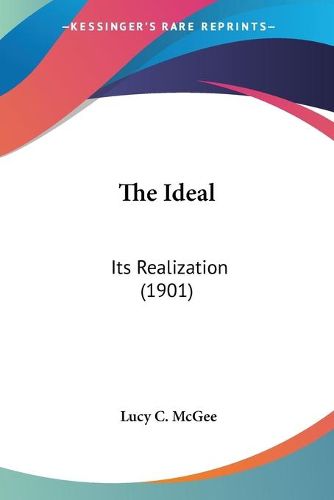Readings Newsletter
Become a Readings Member to make your shopping experience even easier.
Sign in or sign up for free!
You’re not far away from qualifying for FREE standard shipping within Australia
You’ve qualified for FREE standard shipping within Australia
The cart is loading…






Purchase of this book includes free trial access to www.million-books.com where you can read more than a million books for free. This is an OCR edition with typos. Excerpt from book: The Ideal defined by a priori Psychology. The word
Idea
comes from the Greek; it means
to see. The Idea is that which is seen, not without, but within. It does not belong to the world of outlook, but to the world of inlook. Turn the vision within, and you will perceive the Idea. It is, therefore, not of the earth, nor of matter, nor of objectivity. It is mystical, spiritual, subjective, and transcendent in height. The word
image, on the other hand, is derived from the Latin, imitari, to imitate. Look without for the image: it is a creation under the law that operates through Nature and the phenomenal world. The image is synchronous with the physical eye; the Idea, with the spiritual. The significance of the Idea is therefore universal or spiritual. Should Spirit become particular, it would lose both its universality and spirituality. The Idea is of the realm of the subjective consciousness, and it touches the individual just where he is in spiritual unfoldment. When Plato or Emerson perceives the Idea and gives it forth, we recognize it as belonging neither to Plato nor to Emerson. The Idea, passing from the sphere of Being into that of the mind, following the same law that governs the objectification of the Subject, the materialization of Spirit, the specialization of Power, the phenomenalization of Being, takes upon itself form. The thought, the idea, insphered in form, then becomes Platonic, Emersonian. Following the same a priori principle, Ideation is the faculty or capacity of recognizing or bringing Ideas into consciousness. Ideation is, therefore, inner, in the subjective consciousness, in the sphere where form is not. The Imagination, on the other hand, is the power to call up mental images; it is outer, in the sphere of mind, where form is. N…
$9.00 standard shipping within Australia
FREE standard shipping within Australia for orders over $100.00
Express & International shipping calculated at checkout
Stock availability can be subject to change without notice. We recommend calling the shop or contacting our online team to check availability of low stock items. Please see our Shopping Online page for more details.
Purchase of this book includes free trial access to www.million-books.com where you can read more than a million books for free. This is an OCR edition with typos. Excerpt from book: The Ideal defined by a priori Psychology. The word
Idea
comes from the Greek; it means
to see. The Idea is that which is seen, not without, but within. It does not belong to the world of outlook, but to the world of inlook. Turn the vision within, and you will perceive the Idea. It is, therefore, not of the earth, nor of matter, nor of objectivity. It is mystical, spiritual, subjective, and transcendent in height. The word
image, on the other hand, is derived from the Latin, imitari, to imitate. Look without for the image: it is a creation under the law that operates through Nature and the phenomenal world. The image is synchronous with the physical eye; the Idea, with the spiritual. The significance of the Idea is therefore universal or spiritual. Should Spirit become particular, it would lose both its universality and spirituality. The Idea is of the realm of the subjective consciousness, and it touches the individual just where he is in spiritual unfoldment. When Plato or Emerson perceives the Idea and gives it forth, we recognize it as belonging neither to Plato nor to Emerson. The Idea, passing from the sphere of Being into that of the mind, following the same law that governs the objectification of the Subject, the materialization of Spirit, the specialization of Power, the phenomenalization of Being, takes upon itself form. The thought, the idea, insphered in form, then becomes Platonic, Emersonian. Following the same a priori principle, Ideation is the faculty or capacity of recognizing or bringing Ideas into consciousness. Ideation is, therefore, inner, in the subjective consciousness, in the sphere where form is not. The Imagination, on the other hand, is the power to call up mental images; it is outer, in the sphere of mind, where form is. N…